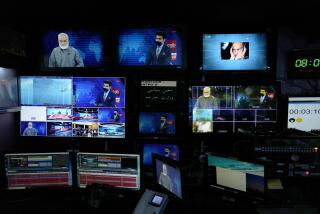Pakistan’s going cable
ISLAMABAD, Pakistan — The scars around her eyes were visible even before the young Pakistani woman lifted her veil, showing TV viewers the burns suffered when her husband doused her with kerosene and set her on fire. Such a spectacle until recently would have been too shocking for Pakistani television.
But two private cable-TV channels -- one beamed into Pakistan from the nearby United Arab Emirates, the other broadcasting in Pakistan -- have been pushing the boundaries of television programming since they started broadcasting in 2002.
Violence against women, government corruption and the flashpoint issue of Kashmir have been debated more openly, while entertainment shows have begun to poke more fun at politicians and the ruling elite.
Such fare would never have been seen on state-run Pakistan Television (PTV), said Muhammad Hafeez, a sociology professor at Punjab University.
“Minds are being broadened,” he said.
The relatively liberal programming is an important trend in this deeply conservative Islamic country, a key ally in the U.S.-led war on terrorism but also a suspected hide-out for Al Qaeda terrorists and dozens of homegrown extremist groups.
Hamna Zahid, a teacher in Islamabad, said the new shows are a revelation.
“Most of us were unaware that these problems existed,” she said, referring to the prevalence of domestic violence in a nation where hundreds of women are killed each year in the name of family honor.
Geo TV debuted as a news channel in August 2002, just a few months after Pakistan passed a law allowing private broadcasters into the market. ARY, the other new private channel, existed briefly as an entertainment channel before Geo, and it began news programming last year.
Both channels feature edgy comedies, hard-hitting newsmagazines and reality-TV shows, even a Pakistani dating show called “Marriage Online” in which participants describe themselves and ask prospective suitors to contact their parents.
“Private channels came in and broke down quite a lot of taboos,” said Talat Hussain, host of a news-talk show on ARY.
More may be coming. The government-approved plans for 22 new television licenses this month, according to Information Minister Sheikh Rashid Ahmed.
Some Pakistanis say the things they are seeing have changed their minds about the issues facing the country, including relations with India.
University student Adnan Asghar said he’s more open to peace since he saw a show that highlighted the similarities between Islam and other faiths. Now he thinks of citizens of predominantly Hindu India as “our brothers with different beliefs” and is optimistic there will be lasting peace.
The new channels aren’t shying away from controversy. Geo exposed Internet cafes as hubs for pornography and meeting spots for young lovers. The show caused a panic among parents, and many of the cafes lost business.
A political satire whose title translates loosely as “That’s What You’d Expect” pokes fun at politicians, including -- mildly -- President Pervez Musharraf, the general who seized power in a 1999 coup.
Ahmed, whose duties include running PTV, acknowledged the limits of state media, saying political and social content must be vetted by authorities. But competition from the new channels has forced PTV to liberalize, Ahmed said.
Even ultraconservative Islamic groups, which have organized violent marches against cable operators that carry Western channels, have sounded positive about the new Pakistani channels.
“Sometimes the program presenters are influenced by Western culture or the Western media,” said Ammer ul-Azeem, a spokesman for the hard-line Mutahida Majlis-e-Amal religious coalition. “But when we measure their efforts on a large scale we come to the opinion that they are more beneficial to society because they have replaced the international media, like BBC, CNN, Fox.”
Hussain of ARY said the new stations will continue fighting an undercurrent of conservatism that has emerged in recent years, while staying true to the nation’s basic values.
“We have a responsibility to nudge it toward the middle, bringing it out of these dark dungeons of PTV programs but protect it from ‘Sex and the City,’ ” he said.
More to Read
Sign up for Essential California
The most important California stories and recommendations in your inbox every morning.
You may occasionally receive promotional content from the Los Angeles Times.









